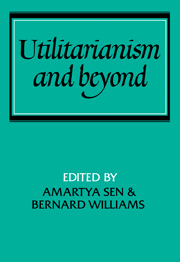Book contents
- Frontmatter
- Contents
- Preface
- Introduction: Utilitarianism and beyond
- 1 Ethical theory and utilitarianism
- 2 Morality and the theory of rational behaviour
- 3 The economic uses of utilitarianism
- 4 Utilitarianism, uncertainty and information
- 5 Contractualism and utilitarianism
- 6 The diversity of goods
- 7 Morality and convention
- 8 Social unity and primary goods
- 9 On some difficulties of the utilitarian economist
- 10 Utilitarianism, information and rights
- 11 Sour grapes – utilitarianism and the genesis of wants
- 12 Liberty and welfare
- 13 Under which descriptions?
- 14 What's the use of going to school?
- Bibliography
1 - Ethical theory and utilitarianism
Published online by Cambridge University Press: 30 January 2010
- Frontmatter
- Contents
- Preface
- Introduction: Utilitarianism and beyond
- 1 Ethical theory and utilitarianism
- 2 Morality and the theory of rational behaviour
- 3 The economic uses of utilitarianism
- 4 Utilitarianism, uncertainty and information
- 5 Contractualism and utilitarianism
- 6 The diversity of goods
- 7 Morality and convention
- 8 Social unity and primary goods
- 9 On some difficulties of the utilitarian economist
- 10 Utilitarianism, information and rights
- 11 Sour grapes – utilitarianism and the genesis of wants
- 12 Liberty and welfare
- 13 Under which descriptions?
- 14 What's the use of going to school?
- Bibliography
Summary
Contemporary moral philosophy (and the British is no exception) is in a phase which must seem curious to anybody who has observed its course since, say, the 1940s. During all that time moral philosophers of the analytic tradition have devoted most of their work to fundamental questions about the analysis of the meaning of the moral words and the types of reasoning that are valid on moral questions. It may be that some of them were attracted by the intrinsic theoretical interest of this branch of philosophical logic; and indeed it is interesting. But it may surely be said that the greater part, like myself, studied these questions with an ulterior motive: they saw this study as the philosopher's main contribution to the solution of practical moral problems such as trouble most of us. For if we do not understand the very terms in which the problems are posed, how shall we ever get to the root of them? I, at least, gave evidence of this motive in my writings and am publishing many papers on practical questions. But, now that philosophers in greater numbers have woken up to the need for such a contribution, and whole new journals are devoted to the practical applications of philosophy, what do we find the philosophers doing? In the main they proceed as if nothing had been learnt in the course of all that analytical enquiry – as if we had become no clearer now than in, say, 1936, or even 1903, how good moral arguments are to be distinguished from bad.
- Type
- Chapter
- Information
- Utilitarianism and Beyond , pp. 23 - 38Publisher: Cambridge University PressPrint publication year: 1982
- 23
- Cited by



